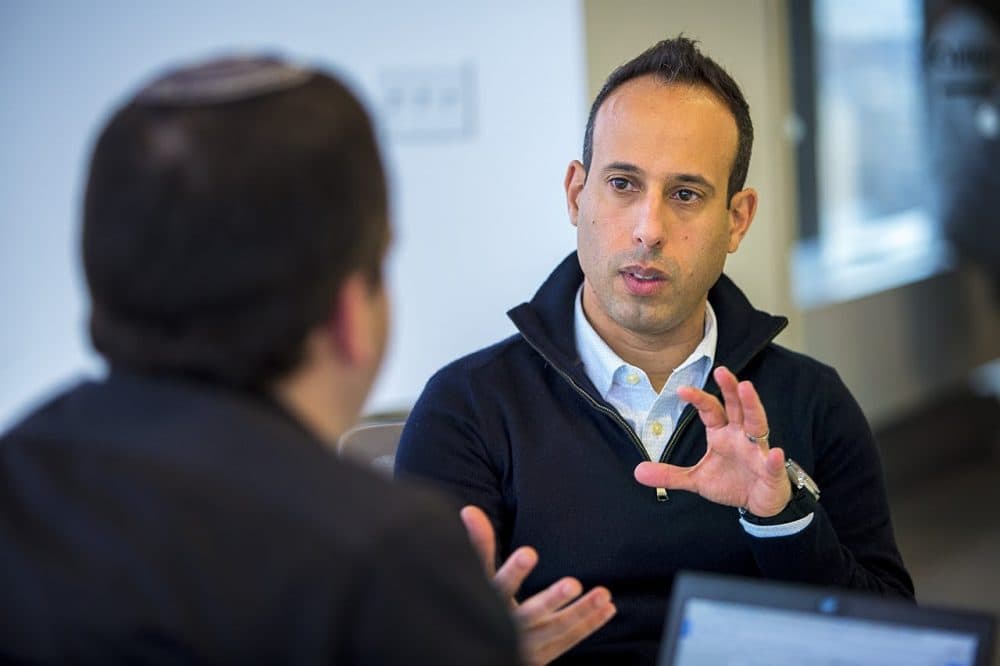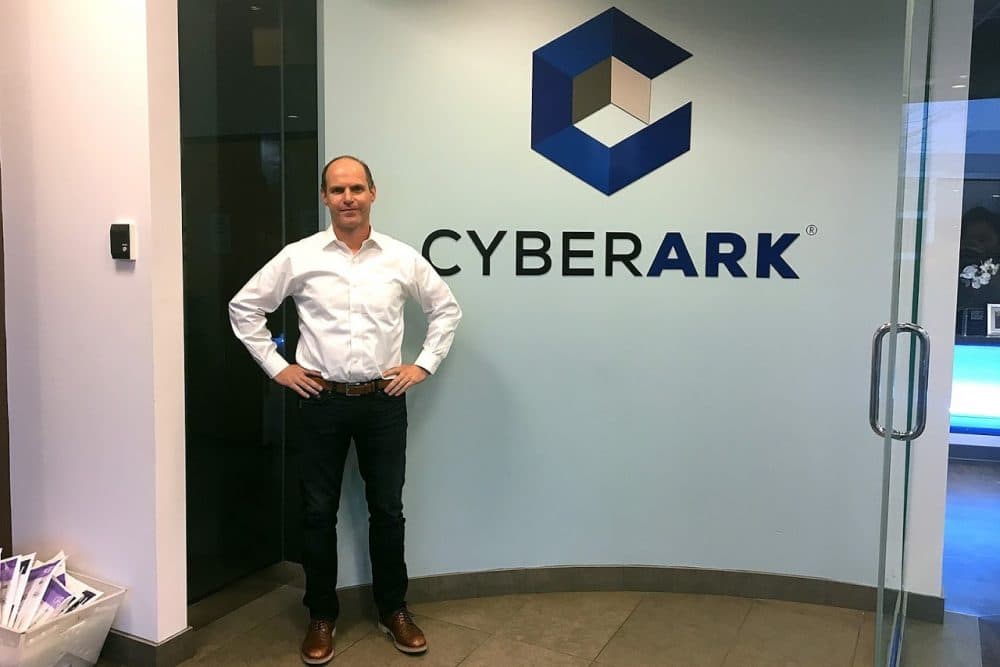Advertisement
Why Israeli Cybersecurity Firms Are Moving From Tel Aviv To Boston

When Lior Div, a veteran of the Israeli military intelligence Unit 8200, co-founded Cybereason in 2012, he quickly realized he needed to expand beyond his country's borders.
"If you want to build a meaningful company (and) not just build a company and sell it, you need to move to somewhere. Tel Aviv is not enough," said Div.
And, like most cybersecurity CEOs in Israel, Div saw America as the promised land.
"Fifty percent of the market in cybersecurity is in the U.S.," he said. "It's pure numbers, this is the biggest market."
But until recently, when most techies in Israel thought of the United States, Div says they only considered one option — Silicon Valley.
Despite the California temptation, he opted for Boston, which, at the time, he said seemed "weird" to people back home in Tel Aviv.
"'Why did you move to Boston and not to Silicon Valley?' — We heard that question back in the day a lot," Div said when we met in his office on the 21st floor of the old Hancock tower with panoramic views of Boston.
But the trend is changing.
A Formula That Draws Companies To Boston
In recent years, more than a dozen Israeli cybersecurity companies have made Massachusetts their home away from home, according to the Israeli Consulate General in Boston. They include Tufin, Morphisec, and Hexadite (recently acquired by Microsoft), to name a few. They're drawn to the city for three main factors: the proximity to customers; the local tech talent; and geography.
"When you do the math, it's the proximity to Israel, the time differences - it makes a huge difference," said Div. "If you want to have an R&D center in Tel Aviv, the times that the team can work together become critical, and the east coast is much more lucrative versus the west coast."
Israeli-founded businesses in Massachusetts generated over $9 billion in revenue in 2015, according to a report from the New England-Israel Business Council. And the fastest growing sector (surpassing life sciences and IT) is cybersecurity, according to the report's lead author, David Goodtree.
"(Cyber) companies that have Israeli founders and a Boston leg ... have returned five and a half billion dollars of acquisition value to investors," Goodtree said.
Advertisement
He says the relationship dates back to the founding of RSA Security at MIT in the early 1980s, which was co-founded by Israeli Adi Shamir and essentially "commercialized cryptography." (RSA was eventually acquired by Hopkinton-based Dell EMC which maintains an Israeli R&D facility to this day.)
"Israel is no doubt the epicenter of global cyber activity today," said Yehuda Yaakov, the Israeli Consul General to New England, after a cyber meeting at Harvard Business School this fall.
Cybersecurity: Israel's 'Next Frontier For Defense'
One major reason for Israel's strength is the military, which has played an outsized role in the development of the cybersecurity industry and created a conveyor belt of talent.
"There is a unique situation in Israel in that everyone is required to serve in the military," said Michael Coden, head of the cybersecurity division of BCG Platinion, the high-tech group within the Boston Consulting Group. "And ... they come out of the military with some really good cybersecurity training."
The Israeli government has long seen cyber as the next frontier for defense vital to national security - akin to land, sea or air warfare.
In the U.S., cybersecurity experts might join a three-letter government agency as a career (think CIA, NSA, or DOD). But because of the mandatory military service in Israel, young entrepreneurs learn technical skills in the army, but then leave after a few years and might launch a startup. There's a natural cycle of cybersecurity experts in the private sector.
"You have the R&D activities going on in the military (and) you have the policies being pushed by the government," said Yaakov. "This feeds into the business world and the academic world."
To this day - Israel remains a leader in the industry because of both its military and its history (frankly, it's just been doing this work longer than most other countries). And in fact, Israeli companies, despite moving operations, sales and marketing etc. to Boston often maintain much of their R&D in Israel.
But the reason they go abroad is financial necessity — it's a matter of trying to monetize cybersecurity, according to Coden at BCG. Israel is home to roughly 8.5 million people.
"They have no choice but to export," said Coden, referring to the country's population.
An International Bridge That Fuels Growth
It's inevitable - Israeli cybersecurity startups will seek an overseas outpost. And when they do, Massachusetts business leaders and politicians are hoping entrepreneurs look to the Boston area. Both former Governor Deval Patrick and current Governor Charlie Baker led delegations to Israel - reaching out to the cybersecurity industry.
"Part of the reason we went to Israel was they were 20 years ahead of everybody else in terms of thinking of cybersecurity as a core strategy," Baker said in a September speech to announce a new cyber center within the Mass Tech Collaborative, a quasi-public agency.
Jeff Fagnan, founder of the venture capital firm Accomplice in Cambridge, said he's been investing in cyber before it was "mainstream" and "hip."
He agrees that Israeli-founded companies have played a major role in Boston's cyber growth. And he says part of the attraction for Israeli firms is the homegrown talent and the DNA of the local workforce.
He says that's partly why even domestic companies like Carbon Black and Rapid7 have chosen to headquarter in the region.
"If you look at where New England's been strong: machine learning, data science, networking, big computing ... that's the kind of thing you need if you're going to build cybersecurity," said Fagnan.
And increasingly there's a symbiotic relationship between digital health, a priority in the local tech ecosystem, and cybersecurity.
But that's all recent history.

Blazing The Trail To Massachusetts
Udi Mokady, the CEO of CyberArk, was one of the early cybersecurity settlers in the Boston area.
"We started in April of '99 in Israel (and) I moved here with a suitcase in the late summer of 2000," Mokady said in his Newton office.
Mokady considers himself one of the founders, leading the "trend of cybersecurity companies selecting Boston." And the CyberArk lobby is flanked with two symbolic flags — the blue and white Star of David and the stars and stripes of the United States.
"We figured out the biggest adoption for security would first come financial services firms, and that very much lent itself to the East Coast," Mokady said.
He knew he had to be on the East Coast to be close to customers. But he wasn't sure where.
"When it came down to choosing between New York and Boston, we very much chose (Boston) because of the talent, and the proximity to so many universities," Mokady said.
CyberArk remains an Israeli business; it went public on the NASDAQ as an Israeli corporation, and like other Israeli-founded cybersecurity companies, most of its R&D remains in Israel, but Boston is its North American headquarters.
Mokady insists though that he wants his employees to feel as if they're working for a global company because as he points out - they're fighting global problems.
But not everyone would agree. Cybersecurity is often seen through a domestic national security lens (the Moscow-based cybersecurity firm Kaspersky Lab, which has an office in Woburn, has been accused of cooperating with Russian security services).
But Mokady dismisses those concerns in the context of Israel. He says Israeli companies, like his, have built credibility and gained a level of trust with customers because of their success. And among its customers are more than 50 percent of Fortune 100 corporations.
"I always say Swiss watches from Switzerland, information security from Israel," Mokady said.
And Div agrees - customers want to see results, and if they can prove results, they'll grow. Two years ago, his company Cybereason had about 30 employees in Boston; now - it's up to about 140. The startup has roughly 200 customers and over $100 million investment from the Japanese firm SoftBank.
"Today, nobody's asking us - 'Why (did) you move to Boston?' It's almost obvious that Boston - this is the place that you can move if you want to be closer to the market," said Div.
This segment aired on December 15, 2017.
